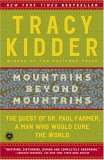Summary | Excerpt | Reading Guide | Reviews | Readalikes | Genres & Themes | Author Bio
The Quest of Dr. Paul Farmer, a Man Who Would Cure the World
by Tracy Kidder

Critics' Opinion:
Readers' Opinion:
First Published:
Sep 2003, 336 pages
Paperback:
Aug 2004, 336 pages
I got Farmer to tell me a little about his life. He was thirty-five. He had graduated from Harvard Medical School and also had a Ph.D. in anthropology from Harvard. He worked in Boston four months of the year, living in a church rectory in a slum. The rest of the year he worked without pay in Haiti, mainly doctoring peasants who had lost their land to a hydroelectric dam. He had been expelled from Haiti during the time of the junta but had sneaked back to his hospital. "After the payment," he said, "of an insultingly small bribe."
I looked for him after the plane landed. We talked some more in a coffee shop, and I nearly missed my connecting flight. A few weeks later, I took him to dinner in Boston, hoping he could help make sense of what I was trying to write about Haiti, which he seemed glad to do. He clarified some of the history for me but left me wondering about him. He had described himself as "a poor people’s doctor," but he didn’t quite fit my preconception of such a person. He clearly liked the fancy restaurant, the heavy cloth napkins, the good bottle of wine. What struck me that evening was how happy he seemed with his life. Obviously, a young man with his advantages could have been doing good works as a doctor while commuting between Boston and a pleasant suburb–not between a room in what I imagined must be a grubby church rectory and the wasteland of central Haiti. The way he talked, it seemed he actually enjoyed living among Haitian peasant farmers. At one point, speaking about medicine, he said, "I don’t know why everybody isn’t excited by it." He smiled at me, and his face turned bright, not red so much as glowing, a luminescent smile. It affected me quite strongly, like a welcome gladly given, one you didn’t have to earn.
But after our dinner I drifted out of touch with him, mainly, I now think, because he also disturbed me. Writing my article about Haiti, I came to share the pessimism of the soldiers I’d stayed with. "I think we should have left Haiti to itself," one of Captain Carroll’s men had said to me. "Does it really matter who’s in power? They’re still gonna have the rich and the poor and no one in between. I don’t know what we hope to accomplish. We’re still going to have a shitload of Haitians in boats wanting to go to America. But, I guess it’s best not even to try and figure it out." The soldiers had come to Haiti and lifted a terror and restored a government, and then they’d left and the country was just about as poor and broken-down as when they had arrived. They had done their best, I thought. They were worldly and tough. They wouldn’t cry about things beyond their control.
I felt as though, in Farmer, I’d been offered another way of thinking about a place like Haiti. But his way would be hard to share, because it implied such an extreme definition of a term like "doing one’s best."
The world is full of miserable places. One way of living comfortably is not to think about them or, when you do, to send money. Over the next five years, I mailed some small sums to the charity that supported Farmer’s hospital in Haiti. He sent back handwritten thank-you notes on each occasion. Once, from a friend of a friend, I heard he was doing something notable in international health, something to do with tuberculosis. I didn’t look into the details, though, and I didn’t see him again until near the end of 1999. I was the one who made the appointment. He named the place.
Excerpted from Mountains Beyond Mountains by Tracy Kidder Copyright© 2003 by Tracy Kidder. Excerpted by permission of Random House, a division of Random House, Inc. All rights reserved. No part of this excerpt may be reproduced or reprinted without permission in writing from the publisher.





The Funeral Cryer by Wenyan Lu
Debut novelist Wenyan Lu brings us this witty yet profound story about one woman's midlife reawakening in contemporary rural China.
Your guide toexceptional books
BookBrowse seeks out and recommends the best in contemporary fiction and nonfiction—books that not only engage and entertain but also deepen our understanding of ourselves and the world around us.